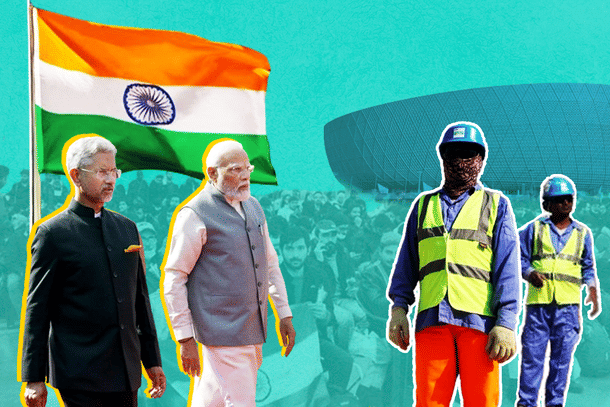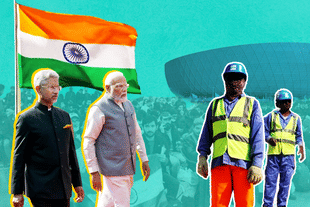Commentary
For Many Indians, Modern-Day Slavery Still Exists — Not At Home, But Overseas
Sharan Setty
Feb 22, 2024, 01:01 PM | Updated 01:01 PM IST
Save & read from anywhere!
Bookmark stories for easy access on any device or the Swarajya app.


Picture this — a bunch of people from rural India, travelling on ships, reaching the coasts of a foreign land — only to find out that they are not there to take plump salaries and do dignified labour, but rather be confined to a contract that they never understood in the first place.
This may very well remind you of the dark days of indentured labour during the age of empires. Well, you are right, but that is only half the picture.
Even today, a similar fate is met by hundreds and thousands of innocent men and women looking to earn a decent living, who travel abroad, to places in West Asia, only to have their passports confiscated, their rights snatched away and their salaries withheld.
The only difference — two centuries ago, they had no one to step up for them, but today, they do, yet they do not.
After the abolition of slavery, indentured labour from India (and other Asian countries) met the demands of the wealthy white landlords and business owners in the West. They had commercial interests in up to 19 colonies and required a workforce to do manual labour in their tea plantations, railway lines, sugarcane and cotton fields.
Slavery was abolished, and the colonisers needed a workforce to do their chores. That is when indentured labour as a concept came into being. It was bonded labour, plain and simple.
People used their thumbprints to approve their ill fate. Between 1834 and 1945, about two million indentured workers from India worked in parts of Africa, the Caribbean, and Southeast Asia. They were called, derogatively, 'coolies'.
In British Guiana, defiance was expressed through Indian folk tradition. Songs depicting people being fooled by recruiters are eerily similar to what is happening even today —
Oh recruiter, your heart is deceitful,
Your speech is full of lies!
Tender may be your voice, articulate and seemingly logical,
But it is all used to defame and destroy
The good names of people.
They slaved away at the demand of their 'owners' for years, many times without raising a voice against the discrimination and harsh treatment they faced. Thousands died. Including when the Kenya-Uganda railway line was being built. Man-eating lions in Africa and deadly diseases on ships to the Caribbean attacked them.
Even at the dawn of the 21st century, racism was visibly present not by colonial masters, but by African natives who led campaigns to "urge Indians to go back to their own country".
In 2002, Mbongeni Ngema, a Zulu playwright, composed a song called 'AmaNdiya' (the Indians) which spread among Indians living in South Africa, decades into Nelson Mandela's fight against the British for imposing apartheid. Mandela himself criticised the song, but the artist refused to apologise.
Of late, the efforts of the Indian government have paid off dividends as rescue missions during times of crises have been effective. Be it Operation Kaveri in Sudan or Operation Rahat in Yemen, the timely intervention of the Indian government has resulted in saving thousands of lives. Families have returned safely back home, and there has been a precedent set ever since.
India's recent effort to obtain an unconditional release of the eight Indian Navy veterans from prison in Qatar has been a historic and major diplomatic victory. Yet, not all quarters are happy about their plight abroad.
Because of the lack of economic growth or job opportunities available in states like Kerala and Bihar, thousands of migrants still search for work abroad, especially in West Asia, in the hope of providing their families with a stable income. Just like the British, middlemen promising fancy salaries and amenities in places like Qatar make them sign contracts that they are not capable of comprehending, and treat them differently upon landing there.
The Indian migrant workers in Gulf states like Saudi Arabia, the United Arab Emirates, and Qatar account for nearly half the remittances received back home. Of these, more than 70 per cent of workers belong to the skilled or semi-skilled category, while some are white-collared workers. In Bahrain alone, nearly half the population are Indian migrant workers. In Kuwait, two-thirds are foreign nationals.
In Saudi Arabia, for instance, Indians are perceived as 'peaceful persons' who do not indulge themselves in any illegal activities. Yet, in case of accidental death or murder, financial compensation given to Muslims, Christians, and Hindus differ from one another. While male Muslims receive about 26,690 USD, Hindus, Buddhists, and Jains receive only USD 1,778.
Passports are often seized, and Indian migrants rely on shady means to come back home. Many have termed this as modern-day bonded labour. In the Gulf, most private sector employers use the kafala system to sponsor their employees' visas. This practice has been condemned by the International Labour Organisation (ILO). Under the kafala system, workers are denied basic human rights such as the freedom to move. Their passports are confiscated, their wages are delayed, and they are deported without cause.
Even the Narendra Modi-led NDA government has been rather lethargic on this front. After all, migrant workers have no pressure groups, no presence in the media, or influence on the government. It is only during major events like the FIFA World Cup did many of the stories come out. There was an outrage.
In 2020 and 2021 alone, nearly 400 Indian workers have died in Qatar.
There should be no negotiation on this front. Indians, regardless of their professional occupation, should not be treated differently with prejudice.
If the same were to happen to an American or a European citizen away from home, it would warrant a diplomatic nightmare for the country that did not act against such crimes. There have been news of Indian students being targeted in hate crimes in Australia and the United States of America, but that does find space in the media.
However, unless the data is outrageous enough, no one in the media cares to blink an eye against the low-wage workers in the Gulf. Whether it is Indians in Israel or Ukraine, they cannot be tricked into fighting their wars, against their consent.
These workers have left their families, and their country, in the hope of a better life abroad. If we can court the white-collar IT employees to return to India and contribute to nation-building, the same level of respect must be given to powerless workers who leave their homes in search of better opportunities.
'Goodwill' and 'soft power' alone won't cut it, as India grows, we will be susceptible to such attacks in the future. Indians are thriving everywhere, and that is a problem, in the eyes of a few. The Indian government must do what is required — set up helpline numbers, offer legal support, make it clear to foreign governments, and identify such problems that exist even today and address them effectively.
No Indian, regardless of his language, religion, or economic background deserves unequal treatment at the hands of shady middlemen and inconsiderate Kafeels.
Sharan Setty (Sharan K A) is an Associate Editor at Swarajya. He tweets at @sharansetty2.





